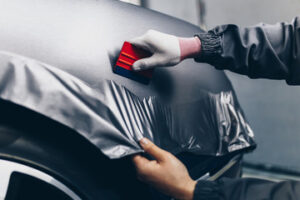Sarasota Car Wraps are a great way to reshape your vehicle or create a custom design. They are easily removable and don’t damage your original paint.
They also add value to your vehicle during trade-in or resale. However, be careful of your chosen color and work with a trusted installer.
Vehicle wraps are large vinyl decals that cover the painted surfaces of a vehicle and can change the color and appearance in an instant. They offer a wide range of designs, colors, and finishes, including matte and chrome. They are also easily removable if you want to revert to the original paint. Wraps are a popular option for people who want to customize their car and protect its paint, but they can also be a great choice for businesses that want to outfit their fleet with custom advertising or business logos.
A quality wrap can last up to four or five years and won’t damage the paint underneath, but it must be properly maintained. For example, it’s important to keep a wrapped vehicle in a garage or covered with a good car cover to avoid direct sunlight and other elements that can cause staining. It’s also best to avoid taking a wrapped car through an automatic car wash because the brushes can pull off the wrap and cause other damage. Instead, it’s recommended to hand wash your vehicle with a recommended cleaner and a soft microfiber cloth.
If you’re thinking of wrapping your vehicle, it’s a good idea to take the time to research and talk to other enthusiasts about the process. It’s not as simple as tinting your windows, and it’s highly recommended to seek out an expert wrap installer if you want the best results. Huz recommends bringing your vehicle to an auto customization shop that specializes in car wraps, as the technicians have the training and tools necessary to complete a high-quality installation. Additionally, he advises that you visit an auto body shop to repair any scratches, chips, or dents before applying the wrap so they don’t show up afterward.
What is the Process?
Wraps can be a great way to add some extra color and design to a vehicle. They are also a much cheaper alternative to a full paint job, and can be removed at the time of resale if desired. However, it’s important to do your homework and research potential installers before hiring anyone. Look for a company with a good reputation and a large portfolio of previous work. You can even ask to see some of the cars they’ve wrapped in person.
It’s also important to remember that a wrapped car will still show any scratches or dings in the original paint, so it’s best to get those fixed before applying the wrap. And while you can still use a commercial car wash with a wrap, it’s best to do so by hand to avoid the damaging effects of brushes and sponges.
Wraps are available in a variety of colors and finishes, from satin to matte to glossy, as well as textured wraps that mimic the appearance of carbon fiber or stainless steel. They are also more customizable than paint, with the option to add lettering or graphics. This versatility means that you can find the perfect wrap for your vehicle, and outfit it to advertise your business or personal style. Plus, a wrap will protect the paint underneath it from fading and damage.
What is the Material?
Car wraps are made from three- to four-mil thick vinyl film that covers a vehicle’s existing paint. They’re available in a wide range of colors and finishes and can be applied to all or part of a vehicle. They offer more design options than a conventional paint job, including unique color combinations and graphic overlays. They’re also removable and don’t damage the paint underneath, which can be helpful if you want to sell or trade in your car.
There are two types of vinyl film used for wraps: calendered and cast. Calendered vinyl is thicker and less pliable and doesn’t conform well to the creases and curves of a car. Cast vinyl, however, is easier to work with and has a better fit and finish than calendered vinyl. Ask your wrap provider which kind of vinyl they use for their services.
Like a painted surface, a wrapped vehicle will fade over time if it’s exposed to the elements for too long. That’s why it’s important to care for a wrapped car properly. It’s best to park it under a roof or cover it at night to prevent excessive sunlight from damaging the wrap. Parking it away from trees that drop sap, like maple and elm, is also beneficial. Wraps can last up to four or five years with the proper care.
It’s also important to avoid using pressure washers on a wrapped vehicle, and only wash it by hand with a cleaner that’s approved for use on vinyl. The heat and salt from automatic car washes can weaken the vinyl and cause it to crack or peel, and the rough texture of a pressure washer can scratch and damage the vehicle’s painted surfaces as well.
What is the Cost?
A full wrap on a mainstream vehicle costs between $2,000 and $4,000. The cost of the materials accounts for one-third of that amount. Labor accounts for the other two-thirds. Larger vehicles such as SUVs and trucks are more expensive because they require more material. The wrap design and style also impact the price. High-end finishes such as carbon fiber and chrome are more costly than basic matte or gloss wraps. Wraps for luxury and exotic cars are even more costly.
The longevity of a car wrap is also impacted by maintenance and conditions. A wrapped car should be parked in a garage or covered with a protective vehicle cover when not being used. It should only be washed by hand with a recommended cleaning product and a soft microfiber cloth. Automatic car washes should be avoided, as they are hard on vinyl. If a wrap has been properly maintained, it can last four or five years.
Many people choose to wrap their cars rather than purchase or lease a new vehicle because they can customize the visuals and protect the paint job. They can also add graphics, logos, or text for personal expression or marketing purposes that don’t affect the resale or trade-in value of the car.
Unlike paint jobs, which can be expensive to maintain and repair, wraps are simple to wash and care for. They also don’t crack or chip, making them a long-term solution. In addition, a wrap can be removed without damaging the original paint job when it’s time to sell or trade in the vehicle. If you’re interested in getting a car wrap, contact a professional wrapping company. They will be able to help you determine the best option for your car and give you a quote.
Can I Wrap My Car?
While a do-it-yourself car wrap may seem like a fun project, it’s not as easy as it looks. It requires the use of a heat gun, a vinyl-wrapping felt squeegee, trim tools and a host of other tools to produce a good result. Vinyl film is sensitive to heat and will stretch, shrink or even stick to itself if not handled properly. There’s also the issue of getting the color, texture and design right—not to mention avoiding mistakes like overstretching and poorly matched seams.
It’s best to leave this type of work to professionals who can handle the technical aspects of applying and removing the wrap. A good shop can provide a quality job that lasts for four or five years—even longer if you protect the wrap from harsh sunlight and other environmental elements.
Car wraps come in a wide range of colors and aesthetics that can enhance a vehicle’s look. Some can even mimic other materials, such as stainless steel or carbon fiber. A wrap is also a great way to promote a business or brand. You can add a logo, contact information and more to the car without compromising its original paint job.
One of the downsides of a wrap is that it can’t protect your car from major scratches or dents. Hulz suggests that if you’re planning on getting your car wrapped, you should get any scratches or dents fixed before the wrap is applied. If the car wrap covers the imperfections, you’ll have a hard time getting them repaired under the new finish.
